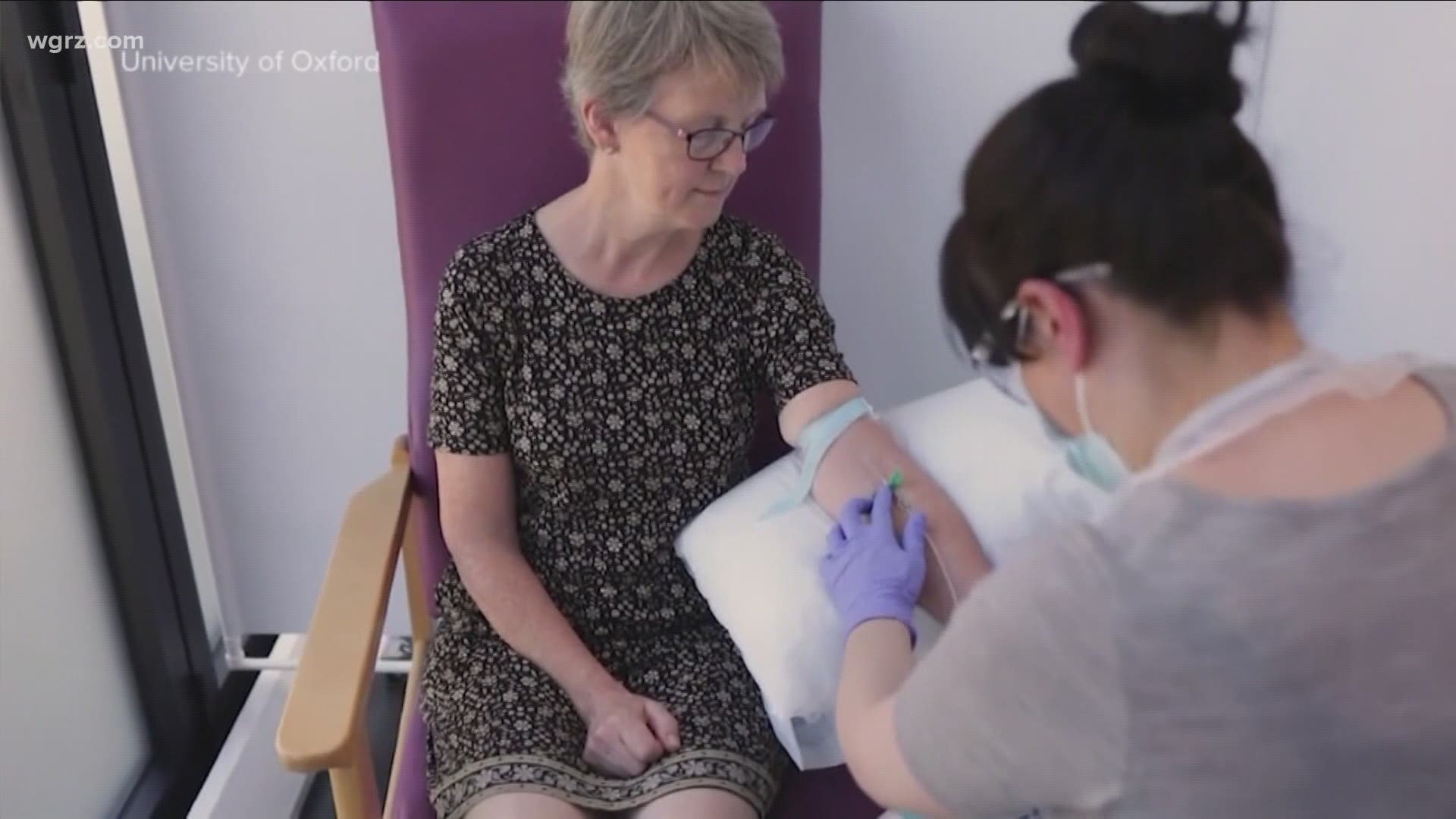BUFFALO, N.Y. — Between the rising numbers of coronavirus cases, the impending shutdowns of businesses and schools, and traditional holiday celebrations being curtailed, there's a lot to fret about these days.
For many, hope is found in the promise of a COVID-19 vaccine before long.
On that front, there was encouraging news from the nation’s capital on Tuesday.
Hope and Help on the Way
“Hope and help are on the way,” said U.S. Health and Human Services Secretary Alex Azar, when HHS and the Department of Defense provided an update on the progress of Operation Warp Speed and the eventual nationwide distribution of vaccines.
While it has not yet been approved, the head of the U.S. effort to produce a coronavirus vaccine recently said the first immunizations could happen on Dec. 12.
On Tuesday, Gen. Gustave Perna, part of Operation Warp Speed, reiterated that federal officials believe they'll be able to distribute 40 million doses by the end of the year. He said they hope to distribute 6.8 million doses to the states in the initial push within 24 hours of an emergency use authorization.
Four days ago, Pfizer formally asked U.S. regulators to allow emergency use of its COVID-19 vaccine, starting the clock on a process that could bring limited first shots as early as next month.
Pfizer and its German partner BioNTech recently announced that its vaccine appears 95% effective at preventing mild to severe COVID-19 disease in a large, ongoing study.
Not far behind is competitor Moderna Inc.’s COVID-19 vaccine. Its early data suggests the shots are as strong as Pfizer’s, and that company expects to also seek emergency authorization within weeks.
The Plan
Secretary Alex Azar said they hope to vaccinate the "most vulnerable" Americans by the end of December, then shift to senior citizens and first responders by the end of January.
General Perna added, "Our cornerstone is the CDC. These experts know how to distribute vaccines and they do it annually. We were able to take all the lessons learn and apply them into a plan.”
Azar predicted anyone in the general public who wants a coronavirus vaccine should be able to get one during the second quarter (April to June) of 2021.
“Of course, the governors will determine distribution within their states, prioritizations within the states, and where to ship to," said Azar, noting the federal government is picking up the entire cost of the massive endeavor.
The Vaccine in New York
In New York State, Governor Andrew Cuomo has insisted that he wants his own selected panel of experts to review the vaccine because he doesn’t trust the Trump administration
Amid worry that this could delay the vaccines arrival here, Cuomo more recently said the review by New York State shouldn’t take that long.
Noted Immunologist Dr. Anthony Fauci called the state's review unnecessary during an interview with the Washington Post, and urged the governor to "Trust the process because the process is sound."
A Sound Process
"The FDA is not going to do a hack job on this," said Dr. Sanjay Sethi of the University at Buffalo Medical School. “The FDA is not going to approve anything if it has concerns.”
Health officials acknowledge there may be hesitancy among some members of the public to take a vaccine (something that usually takes several years to develop), which was rolled under Operation Warp Speed in less than one year.
But they also note it may be the most scrutinized vaccine in history.
“I’ll be first in line to get it when they tell me I can,” Sethi said. “Are there still going to be, or could there be side effects which happen to one out of 100,000 people? Yes. But I would rather take that chance versus the chance of getting COVID and spreading it. To me, it's a very easy decision. Take the vaccine.”
Getting the Vaccine Out
Perna also touched on the challenges surrounding the distribution of Pfizer's vaccine, which must be kept at the ultra-cold temperature of around minus-70 degrees Celsius (minus-94 Fahrenheit). He explained that Pfizer has developed a container with dry ice that can keep the vaccine at the right temperature for up to 20 days.
Meanwhile, another drug company, Vaxart, says its plan is to come out with a vaccine which will be in pill or tablet form, and which pills can be stored at room temperature. However, that vaccine is still in an earlier trial stage.
Perna also confirmed they are working on ways to remind those who get an initial coronavirus vaccine that they need to still get a second dose. Some of the plans under consideration include physical vaccine cards and "elaborate automated plans" at the state and national level to send people reminders.
On the Same Page
Azar also confirmed that HHS's transition official is now in contact with Joe Biden's team to ensure a smooth transition to the new administration.
"We are immediately getting them all of the pre-prepared transition materials," Azar said, in noting his agency is fully cooperating with the Biden transition team.
"We will ensure coordinated briefings with them to ensure they get whatever information they believe that they will need that's consistent with statute and past practice. Transition planning and execution will be professional, cooperative, collaborative, and in the best spirit of looking out for the health and well being of the American people and in particular saving lives through this COVID-19 pandemic."
This story includes reporting from the Associated Press

